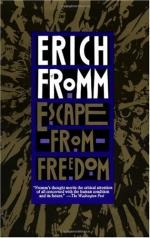|
This section contains 489 words (approx. 2 pages at 400 words per page) |

|
Escape from Freedom Summary & Study Guide Description
Escape from Freedom Summary & Study Guide includes comprehensive information and analysis to help you understand the book. This study guide contains the following sections:
This detailed literature summary also contains Topics for Discussion and a Free Quiz on Escape from Freedom by Erich Fromm.
"Escape from Freedom" is Erich Fromm's psychological history of the social conditions that developed in Europe between the Middle Ages and the mid-20th century which culminated in the rise of the Nazi Party to power in Germany under Adolf Hitler. Fromm is writing in 1941, after Hitler has come to power and begun his aggressive campaign to conquer Europe, but before the United States has entered what is to become the Second World War. The underlying question of Fromm's work is how the German people allowed HItler's totalitarian regime to gain power seemingly willingly and with their enthusiastic support. A secondary question Fromm asks is whether or not democracy such as that found outside of Germany makes a people safe from similar developments. He identifies a basic psychological need which has led to the support for the Nazis in Germany and concludes by warning that this need is not necessarily filled in a democracy.
Fromm answers his main question by characterizing the social character of the German people after World War I as one especially susceptible to the message of the Nazi Party. He traces this social character to the individual psychological characters of the people in the German lower middle class. These people have become especially isolated from their work and their society owing to the rise of capitalism that began during the Protestant Reformation, Fromm argues. They have become economically "free" as employees of the capital holders, but this freedom is actually a burden as they try to reconnect the ties to their work that earlier generations enjoyed.
The seeds of this isolation are planted by the Protestant doctrines of Luther and Calvin, who teach that man stands alone before God, not with the Catholic Church as an intermediary. Furthermore, they teach that man is essentially bad and must work in order to achieve or prove his salvation. Man is now free from the authority of the Church, but is now responsible for himself before a vengeful God.
Man naturally seeks to escape from the isolation and alienation that accompanies this growing "freedom," Fromm contends. By applying psychoanalytic methods, Fromm concludes that one primary mechanism by which individuals escape is to make themselves dependent on others. Tied directly to this mechanism is a parallel tendency for individuals to try to dominate others. Adolf Hitler and the Nazi Party masterfully exploit this mechanism, Fromm explains, by promising their followers a kind of freedom which appeals to their desire to submit to a powerful leader who will lead them into victory over others.
Fromm concludes his work by warning that this kind of psychological need is largely a function of capitalism, which tends to isolate people from their work and from each other. He calls for the creation of a planned socialist economy that allows for the development of true self-awareness and positive development by eliminating the psychological need to "escape" the burden of freedom.
Read more from the Study Guide
|
This section contains 489 words (approx. 2 pages at 400 words per page) |

|



